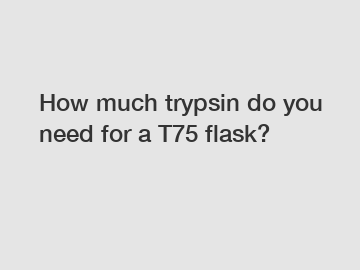How much trypsin do you need for a T75 flask?
Trying to understand how much trypsin is required for a T75 flask is an important aspect of cell culture protocols. The quantity of trypsin needed can vary depending on the specific requirements, and it is crucial to calculate the optimum amount to ensure successful cell detachment. In this article, we will delve into the factors that influence the amount of trypsin needed for a T75 flask, the significance of this information, and its practical implications.
To answer the question directly, the amount of trypsin required for a T75 flask is typically around 2-3 mL. However, it is essential to consider various factors that might affect this amount, such as cell type, confluency, and preferred trypsinization protocol.
Firstly, the cell type plays a significant role in determining the amount of trypsin needed for cell detachment. Different cell lines have varying sensitivities to trypsin, and it is crucial to consider the optimal enzymatic treatment for each cell type. Some cell lines might require higher or lower amounts of trypsin depending on their adherence characteristics and growth patterns.

Secondly, the confluency of the cells in the T75 flask impacts the trypsin concentration required. Higher confluency indicates a denser cell layer, which necessitates an increased trypsin volume for efficient detachment. Conversely, if the cells are less confluent, a smaller amount of trypsin might be sufficient.
Furthermore, the preferred trypsinization protocol selected by the researcher might also influence the amount of trypsin needed. Different protocols, such as the use of trypsin with or without EDTA, might affect the enzymatic activity and, consequently, the required volume. It is essential to follow the recommended protocol for the specific cell line to achieve optimal results.
Understanding the optimum trypsinization conditions can have significant implications for cell culture research. Using the appropriate amount of trypsin ensures efficient cell detachment without causing excessive damage or loss of cell viability. Insufficient trypsin can result in incomplete detachment and hinder downstream analyses, while excessive trypsin might lead to cell death and loss of important cellular characteristics.
In addition, accurate trypsinization can help maintain cell line integrity and prevent contamination. By utilizing the right trypsin volume, researchers can achieve consistent and reproducible results in their experiments.
In conclusion, the amount of trypsin required for a T75 flask typically ranges from 2-3 mL, but several factors influence this quantity. Understanding the specific cell type, confluency, and preferred trypsinization protocol are crucial for accurate calculation. Applying the optimal trypsinization conditions ensures successful cell detachment, maintains cell line integrity, and improves the quality of cell culture experiments.
Contact us to discuss your requirements of culture flask sizes, wholesale cell culture roller bottle, cell factory system. Our experienced sales team can help you identify the options that best suit your needs.


